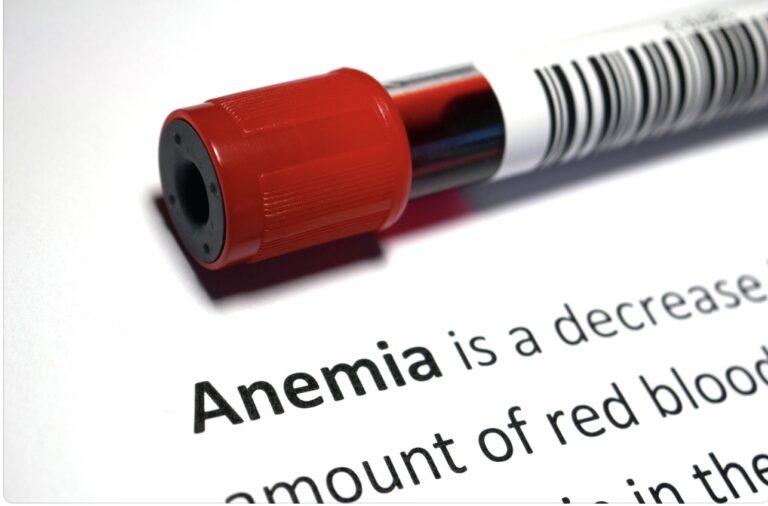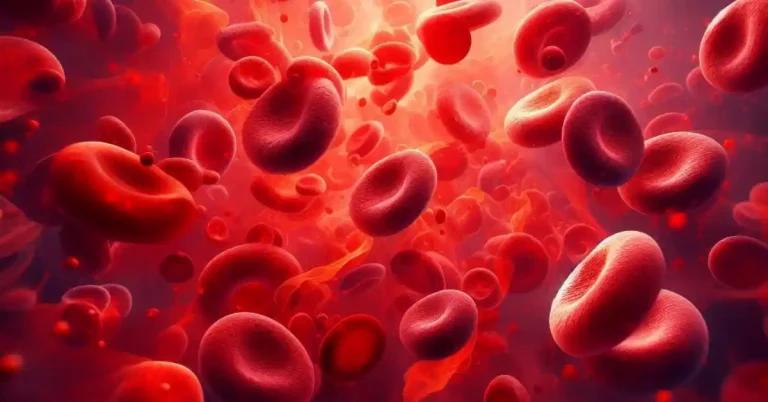Anaemia is a common health condition that affects millions of individuals worldwide. It occurs when the blood doesn’t have enough hemoglobin or enough red blood cells. Without enough iron, the body can’t make hemoglobin for red blood cells. These symptoms of iron deficiency can lead to a wide range of symptoms, from mild fatigue to more severe complications.
Understanding the signs and symptoms of anemia is important for a timely diagnosis and effective treatment. Here, we will take a closer look at the symptoms of anemia, to give you the knowledge to recognise and seek appropriate medical attention.
What is anaemia?
Anaemia is a medical condition characterised by a lack in the number or function of red blood cells responsible for transporting oxygen to the body’s tissues. Hemoglobin, a protein found within red blood cells, plays a crucial role in this process. When the body lacks sufficient hemoglobin or red blood cells, the tissues and organs may not receive the necessary oxygen, leading to various symptoms.
Types of anaemia
There are several types of anaemia, each with its underlying causes and unique characteristics. The most common forms include:
Iron deficiency anemia
This is the most common type of anemia and is the result of a low amount of iron levels in the body, which is essential for the production of hemoglobin. It can be caused by factors such as blood loss, poor dietary iron intake, or malabsorption issues.
Vitamin deficiency anaemia
Anaemia can also arise from a lack of certain vitamins, particularly vitamin B12 and folate, which are crucial for the formation of healthy red blood cells.
Anaemia of inflammation
Chronic conditions that trigger ongoing inflammation, such as cancer, HIV/AIDS, rheumatoid arthritis, or kidney disease, can impair the body’s ability to produce sufficient red blood cells.
Aplastic anemia
This rare and life-threatening form of anemia occurs when the bone marrow fails to produce enough new blood cells, leading to a severe shortage of red blood cells, white blood cells, and platelets.
Haemolytic anaemia
In this type of anaemia, red blood cells are destroyed faster than the body can replace them, often due to underlying blood disorders such as sickle cell anemia or autoimmune conditions such as Crohn’s Disease.
Symptoms of anemia
Symptoms of anemia can vary widely, depending on the severity of the condition, the underlying cause, and the individual’s overall health. However, several common signs and symptoms are often associated with anaemia:
Fatigue and weakness
One of the most prevalent symptoms of anemia is a persistent feeling of tiredness and a lack of energy. Individuals with anaemia may find it challenging to perform even routine tasks due to the reduced oxygen supply to their tissues.
Pale or yellowish skin
Anaemia can cause the pale skin or in some cases, take on a yellowish hue. This is particularly noticeable in individuals with lighter skin tones.
Shortness of breath
As the body struggles to deliver sufficient oxygen to the lungs and other organs, individuals with anaemia may experience shortness of breath, especially during physical activity.
Irregular heartbeat
Anaemia can place additional strain on the heart, leading to an irregular or rapid heartbeat, known as arrhythmia.
Dizziness and lightheadedness
The reduced oxygen supply to the brain can cause feelings of dizziness, lightheadedness, or even episodes of fainting.
Chest pain
Some individuals with anaemia may experience chest pain or discomfort, which can be a result of the heart working harder to pump oxygenated blood throughout the body.
Cold hands and feet
Poor circulation and reduced oxygen levels can cause the extremities, such as the hands and feet, to feel unusually cold.
Headaches
Anaemia-related headaches are often described as persistent or recurrent, and may worsen with physical activity.
Brittle nails and hair loss
In some cases, anaemia can contribute to the weakening of nails and the thinning or loss of hair.
Pica (craving for non-food items)
Individuals with certain types of anaemia, particularly iron deficiency anemia, may develop a craving for non-food items, such as ice, clay, or dirt, a condition known as pica.
Lifestyle modifications
While medical treatments are often necessary to treat the underlying causes of anaemia, making lifestyle changes can also significantly manage the condition and prevent its recurrence.
Dietary changes
This involves increasing the consumption of foods with good sources of iron such as:
- Dark green leafy vegetables such as spinach and broccoli
- Some cereals are fortified with iron
- Lean red meat
- Chicken
- Turkey
- Egg yolks
It is also important to ensure adequate intake of vitamins B12 and folate, and pairing iron-containing items with vitamin C-rich foods such as orange juice to enhance absorption.
Hydration and exercise
Maintaining proper hydration and engaging in regular physical activity can also support the body’s ability to produce and utilise red blood cells effectively. Staying well-hydrated helps facilitate the transport of oxygen and nutrients, while moderate exercise can stimulate the production of new red blood cells.
Things to avoid
Certain substances, such as coffee, tea, and calcium supplements, can interfere with the body’s absorption of iron. Avoiding or limiting the consumption of these substances, particularly around mealtimes, can help optimise the effectiveness of iron-rich foods and supplements.
Managing underlying conditions
For individuals with anaemia caused by chronic medical conditions, such as autoimmune disorders or kidney disease, managing the underlying condition is crucial. Adhering to prescribed treatments, medications, and lifestyle recommendations can help control the root cause and prevent or reduce the development of anaemia.
By incorporating these lifestyle changes alongside medical interventions, individuals with anaemia can work towards restoring their red blood cell levels to alleviate symptoms, and reduce the risk of long-term complications.
Diagnosing anaemia
To diagnose anaemia, healthcare providers will typically perform a series of blood tests, including a complete blood count (CBC) to measure the levels of hemoglobin and red blood cells. Additional tests, such as iron, vitamin B12 and folate levels, or a peripheral blood smear, may be ordered to determine the underlying cause of the anaemia.
Treating anaemia
While a balanced diet is a foundation for managing anaemia, in some cases, dietary changes alone may not be sufficient. Your healthcare provider may recommend iron supplementation to address specific nutrient deficiencies and accelerate the recovery process.
Conclusion
By understanding the symptoms of anemia you can seek timely medical attention and work with your healthcare provider to develop an effective treatment plan. Remember, addressing anaemia is not only about managing the immediate symptoms but also addressing the cause.
Sources
Medical Disclaimer
NowPatient has taken all reasonable steps to ensure that all material is factually accurate, complete, and current. However, the knowledge and experience of a qualified healthcare professional should always be sought after instead of using the information on this page. Before taking any drug, you should always speak to your doctor or another qualified healthcare provider.
The information provided here about medications is subject to change and is not meant to include all uses, precautions, warnings, directions, drug interactions, allergic reactions, or negative effects. The absence of warnings or other information for a particular medication does not imply that the medication or medication combination is appropriate for all patients or for all possible purposes.









